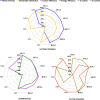Techno-economic Analysis of Sustainable Biofuels for Marine Transportation
- PMID: 36409825
- PMCID: PMC9730900
- DOI: 10.1021/acs.est.2c03960
Techno-economic Analysis of Sustainable Biofuels for Marine Transportation
Abstract
Renewable, low-carbon biofuels offer the potential opportunity to decarbonize marine transportation. This paper presents a comparative techno-economic analysis and process sustainability assessment of four conversion pathways: (1) hydrothermal liquefaction (HTL) of wet wastes such as sewage sludge and manure; (2) fast pyrolysis of woody biomass; (3) landfill gas Fischer-Tropsch synthesis; and (4) lignin-ethanol oil from the lignocellulosic ethanol biorefinery utilizing reductive catalytic fractionation. These alternative marine biofuels have a modeled minimum fuel selling price between $1.68 and $3.98 per heavy fuel oil gallon equivalent in 2016 U.S. dollars based on a mature plant assessment. The selected pathways also exhibit good process sustainability performance in terms of water intensity compared to the petroleum refineries. Further, the O and S contents of the biofuels vary widely. While the non-HTL biofuels exhibit negligible S content, the raw biocrudes via HTL pathways from sludge and manure show relatively high S contents (>0.5 wt %). Partial or full hydrotreatment can effectively lower the biocrude S content. Additionally, co-feeding with other low-sulfur wet wastes such as food waste can provide another option to produce raw biocrude with lower S content to meet the target with further hydrotreatment. This study indicates that biofuels could be a cost-effective fuel option for the marine sector. Marine biofuels derived from various feedstocks and conversion technologies could mitigate marine biofuel adoption risk in terms of feedstock availability and biorefinery economics.
Keywords: decarbonization; heavy fuel oil; marine biofuels; sustainability; techno-economic analysis.
Conflict of interest statement
The authors declare no competing financial interest.
Figures


References
-
- Mofor L.; Nuttall P.; Newell A.. Renewable Energy Options for Shipping: Technology Brief. 2015, https://www.irena.org/-/media/Files/IRENA/Agency/Publication/2015/IRENA_... (accessed October 5, 2022).
-
- DNV GL . Maritime Forecast to 2050: Energy Transition Outlook 2020. 2021, https://eto.dnv.com/2021/maritime-forecast-2050/about (accessed October 5, 2022).
-
- Issa M.; Ilinca A.. Petrodiesel and Biodiesel Fuels for Marine Applications. In Petrodiesel Fuels; Konur O., Ed.; CRC Press: Boca Raton, FL, 2021; pp 1015–1033.
Publication types
MeSH terms
Substances
LinkOut - more resources
Full Text Sources

